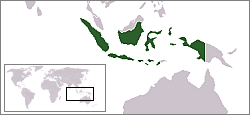Related Research Articles

DNA profiling is the process of determining an individual's deoxyribonucleic acid (DNA) characteristics. DNA analysis intended to identify a species, rather than an individual, is called DNA barcoding.

Biodiversity is the variability of life on Earth. It can be measured on various levels. There is for example genetic variability, species diversity, ecosystem diversity and phylogenetic diversity. Diversity is not distributed evenly on Earth. It is greater in the tropics as a result of the warm climate and high primary productivity in the region near the equator. Tropical forest ecosystems cover less than one-fifth of Earth's terrestrial area and contain about 50% of the world's species. There are latitudinal gradients in species diversity for both marine and terrestrial taxa.

An ecoregion is an ecologically and geographically defined area that is smaller than a bioregion, which in turn is smaller than a biogeographic realm. Ecoregions cover relatively large areas of land or water, and contain characteristic, geographically distinct assemblages of natural communities and species. The biodiversity of flora, fauna and ecosystems that characterise an ecoregion tends to be distinct from that of other ecoregions. In theory, biodiversity or conservation ecoregions are relatively large areas of land or water where the probability of encountering different species and communities at any given point remains relatively constant, within an acceptable range of variation . Ecoregions are also known as "ecozones", although that term may also refer to biogeographic realms.

Forensic science, also known as criminalistics, is the application of science principles and methods to support legal decision-making in matters of criminal and civil law.
Conservation status is a measure used in conservation biology to assess an ecoregion's degree of habitat alteration and habitat conservation. It is used to set priorities for conservation.

The Nature Conservancy (TNC) is a global environmental organization headquartered in Arlington, Virginia. As of 2021, it works via affiliates or branches in 79 countries and territories, as well as across every state in the US.
A rape kit or rape test kit is a package of items used by medical, police or other personnel for gathering and preserving physical evidence following an instance or allegation of sexual assault. The evidence collected from the victim can aid the criminal rape investigation and the prosecution of a suspected assailant. DNA evidence can have tremendous utility for sexual assault investigations and prosecution by identifying offenders, revealing serial offenders through DNA matches across cases, and exonerating those who have been wrongly accused.

The People of the State of California v. Orenthal James Simpson was a criminal trial in Los Angeles County Superior Court, in which former NFL player and actor O. J. Simpson was tried and acquitted for the murders of his ex-wife Nicole Brown Simpson and her friend Ronald Goldman, who were stabbed to death outside Brown's condominium in Los Angeles on June 12, 1994. The trial spanned eight months, from January 24 to October 3, 1995.

The FBI Laboratory is a division within the United States Federal Bureau of Investigation that provides forensic analysis support services to the FBI, as well as to state and local law enforcement agencies free of charge. The lab is located at Marine Corps Base Quantico in Quantico, Virginia. Opened November 24, 1932, the lab was first known as the Technical Laboratory. It became a separate division when the original Bureau of Investigation (BOI) was renamed the FBI.
It is possible to convict someone of murder without the purported victim's body in evidence. However, cases of this type have historically been hard to prove, often forcing the prosecution to rely on circumstantial evidence, and in England there was for centuries a mistaken view that in the absence of a body a killer could not be tried for murder. Developments in forensic science in recent decades have made it more likely that a murder conviction can be obtained even if a body has not been found.

The environment of Indonesia consists of 17,508 islands scattered over both sides of the equator. Indonesia's size, tropical climate, and archipelagic geography, support the world's second highest level of biodiversity after Brazil.

The Coral Triangle (CT) is a roughly triangular area in the tropical waters around Indonesia, Malaysia, Papua New Guinea, the Philippines, Solomon Islands, and Timor-Leste. This area contains at least 500 species of reef-building corals in each ecoregion. The Coral Triangle is located between the Pacific and Indian oceans and encompasses portions of two biogeographic regions: the Indonesian-Philippines Region, and the Far Southwestern Pacific Region. As one of eight major coral reef zones in the world, the Coral Triangle is recognized as a global centre of marine biodiversity and a global priority for conservation. Its biological resources make it a global hotspot of marine biodiversity. Known as the "Amazon of the seas", it covers 5.7 million square kilometres (2,200,000 sq mi) of ocean waters. It contains more than 76% of the world's shallow-water reef-building coral species, 37% of its reef fish species, 50% of its razor clam species, six out of seven of the world's sea turtle species, and the world's largest mangrove forest. The epicenter of that coral diversity is found in the Bird’s Head Seascape of Indonesian Papua, which hosts 574 species. Within the Bird’s Head Seascape, the Raja Ampat archipelago is the world’s coral diversity bull’s eye with 553 species. In 2014, the Asian Development Bank (ADB) reported that the gross domestic product of the marine ecosystem in the Coral Triangle is roughly $1.2 trillion per year and provides food to over 120 million people. According to the Coral Triangle Knowledge Network, the region annually brings in about $3 billion in foreign exchange income from fisheries exports, and another $3 billion from coastal tourism revenues.

The wildlife of Canada or biodiversity of Canada consist of over 80,000 classified species, and an equal number thought yet to be recognized. Known fauna and flora have been identified from five kingdoms: protozoa represent approximately 1% of recorded species; chromist ; fungis ; plants ; and animals. Insects account for nearly 70 percent of documented animal species in Canada. More than 300 species are found exclusively in Canada.

Environmental issues are disruptions in the usual function of ecosystems. Further, these issues can be caused by humans or they can be natural. These issues are considered serious when the ecosystem cannot recover in the present situation, and catastrophic if the ecosystem is projected to certainly collapse.

Dame Alcyion Cynthia Kiro is a New Zealand public-health academic, administrator, and advocate, who has been serving as the 22nd governor-general of New Zealand since 21 October 2021. Kiro is the first Māori woman and the third person of Māori descent to hold the office.

The World Resources Institute (WRI) is a global research non-profit organization established in 1982 with funding from the MacArthur Foundation under the leadership of James Gustave Speth. Subsequent presidents include Jonathan Lash (1993–2011), Andrew D. Steer (2012–2021) and current president Ani Dasgupta (2021–present).

Biodiversity loss happens when plant or animal species disappear completely from Earth (extinction) or when there is a decrease or disappearance of species in a specific area. Biodiversity loss means that there is a reduction in biological diversity in a given area. The decrease can be temporary or permanent. It is temporary if the damage that led to the loss is reversible in time, for example through ecological restoration. If this is not possible, then the decrease is permanent. The cause of most of the biodiversity loss is, generally speaking, human activities that push the planetary boundaries too far. These activities include habitat destruction and land use intensification. Further problem areas are air and water pollution, over-exploitation, invasive species and climate change.
Parabon NanoLabs, Inc. is an American company based in Reston, Virginia, that develops nanopharmaceuticals and provides DNA phenotyping services for law enforcement organizations.

Earyn McGee is an American herpetologist and science communicator. She is an American Association for the Advancement of Science (AAAS) IF/THEN Ambassador and a 2020 AAAS Mass Media Science & Engineering Fellow. In response to the racism faced by Black birdwatcher Christian Cooper in the Central Park birdwatching incident, McGee co-organized Black Birders Week to celebrate Black birders.
Jasmin Graham is an American marine biologist known for her work in conservation and social justice, with a special focus on shark science. She is a co-founder of Minorities in Shark Sciences.
References
- 1 2 3 4 5 6 7 "Tiara N. Moore, Postdoctoral Fellow". The Nature Conservancy in Washington. Retrieved 17 June 2021.
- 1 2 Baillie, Katherine Unger. "Black in Marine Science is building a community". Penn Today. University of Pennsylvania. Retrieved 17 June 2021.
- ↑ Moore, Tiara N. (2019). "Nutrient Enrichment Promotes Eutrophication in the Form of Macroalgal Blooms Causing Cascading Effects in Two Anthropogenically Disturbed Coastal Ecosystems". eScholarship. UCLA. Retrieved 17 June 2021.
- ↑ Blackmon, Douglas A. (24 November 2012). "Republicans face unexpected challenges in coastal South amid shrinking white vote". Washington Post.
- 1 2 Smith, Matthew (5 February 2021). "Confronting racism while elevating Black voices in science". KIRO 7 News Seattle. Retrieved 17 June 2021.
- ↑ Smith, Matthew (2021-02-06). "Confronting racism while elevating Black voices in science". KIRO 7 News Seattle. Retrieved 2021-12-19.
- ↑ "Dr. Tiara Moore: Biodiversity and diversity advocate". PARLEY. Retrieved 2021-12-19.
- ↑ Norton, Kara (December 22, 2020). "Inaugural 'Black in X' Weeks Foster Inclusivity and Empowerment in STEM". www.pbs.org. Retrieved 2021-12-19.
- ↑ "Where are the Black geoscientists? Online campaign calls for diversity". Christian Science Monitor. 2020-09-11. ISSN 0882-7729 . Retrieved 2021-12-19.
- 1 2 Zulian, Meghan (29 November 2020). "#BlackInMarineScienceWeek increases the visibility of Black marine scientists". Massive Science. Retrieved 17 June 2021.
- ↑ Russ, Valerie. "Science superhero: Philly woman with a Ph.D. dives the oceans to research coral reefs and fight climate change". The Philadelphia Inquirer. Retrieved 17 June 2021.
- ↑ "TEAM". Black in Marine Science.
- ↑ "A Zoom Meeting For Women Of Color Was Hijacked By Trolls Shouting The N-Word". BuzzFeed News. Retrieved 2021-12-19.
- ↑ King, Daniel. "What do the cast of "Hamilton" and Jim Halpert from "The Office" have in common?". Mother Jones. Retrieved 2021-12-19.
- ↑ Givens, Dana (2020-04-03). "Black People Are Facing Racial Discrimination On Zoom Meetings Through 'Zoombombing'". Black Enterprise. Retrieved 2021-12-19.
- ↑ "Tiara Moore: We All Belong". California Academy of Sciences. May 15, 2021. Retrieved 2021-12-19.
- 1 2 Bush, Evan (30 September 2019). "How restoring old-growth forest in Washington state could help fight climate change". Phys.org. Retrieved 17 June 2021.
- 1 2 Deal, Greg K. "Forensic forestry: Greenwood High alum researches environmental DNA to help climate". Index-Journal. Retrieved 22 June 2021.
- ↑ Bush, Evan (2019-09-23). "How restoring old-growth forest in Washington state could help fight climate change". The Seattle Times. Retrieved 2021-12-19.
- ↑ "Forensic Ecology (NATURE DETECTIVE) with Tiara Moore". alie ward. Retrieved 2021-12-19.
- ↑ "Black Voices for Black Justice Fund Announces Third Round of Awards to Expand the Impact of Black Activists Advancing Racial Justice". Business Wire. Flight PR. 2021-05-11. Retrieved 17 June 2021.
- ↑ "Black Voices for Black Justice fund announces the third round of awards to expand the impact of black activists advancing racial justice". www.bloomberg.com. May 11, 2021. Retrieved 2021-12-19.